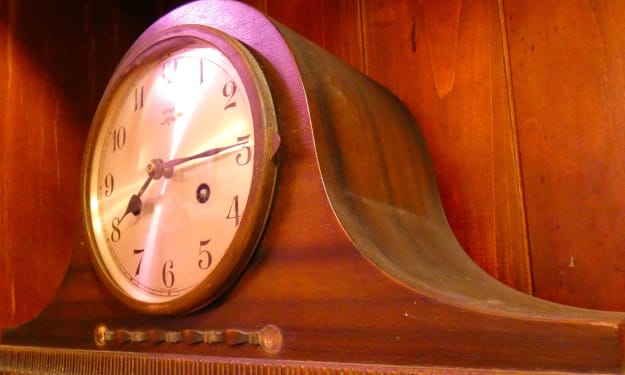Mazzarotti Manor
Does anyone ever really come home?

In the stormy afternoon light, sepia clouds gathered making promises to the dust below that they had no thought to keep. Bare branches of a lone, dying eucalypt reached towards curled shingles on a square, slatted cottage. Windows facing east were long boarded over. The grandest part of the dilapidated building was a huge chimney, the fireplace reaching the height of the ceiling line, with chimney pointing to the sky past the roof apex, almost as though reaching towards an arrow of ducks on their way to greener marshes.
To the casual observer, the building was a bleak, empty shell, at best shielding vermin or snakes from the midday heat. Time was doing its best to erode any life at all from the walls. But one who knows better, perhaps the likes of a well-known local psychic, love lived there still, and perhaps a little bit more.
As fickle as the skies proved to be, fat raindrops began to fall, causing teaspoon-sized craters in the dust around the house. The ducks long gone, the air darkened. Ozone and damp earth combined for that unique aroma of healing and growth. And if anyone had been watching, a glimmer of a candle could be seen through a crack in the boarded windows.
With truly mystical proportions, the sodden dust formed a crust, cracked and moved aside for germinating seeds which had been dormant, just waiting for serendipity. Around the brick foundations, bean shoots began to climb the walls, garlic peeked out from the ground, and a pile of sticks put on its bay leaf clothing. Square indentations a little further to the south of the house, which had suspicious three metre by one-and-a-half metre proportions, took on a less sinister appearance and a healthy crop of tomatoes sprouted to a full ten centimetre height within the hour.
Soon, bluey-grey wisps could be seen curling out from the chimney. As the light faded, the smoke took on a slight luminous tinge, reflecting radiated light from the flames below. A possum and its babies climbed down from the eucalypt and nestled in a hip hole by the chimney, enjoying the warmth of the bricks.
Presently, the slat door of the house opened. A hunched figure in long skirts, blouse and cardigan, hobbled out. Draped over her grey hair was a black, fringed shawl. The old woman wore a gingham red and white apron which she bunched up in one gnarly hand, while leaning with the other hand on a thick gum branch which clearly she had used for an age as her walking stick.
She hobbled over to the tomatoes which impossibly had produced a hearty crop of Roma tomatoes. She picked a half dozen of the ripe fruit then made her way along a path lined in old, handmade bricks. Stopping briefly at the revived bush for some bay leaves, the old woman picked a vigorous bunch of the herb, paused briefly to look at the garlic bulbs along the foundation stones, then decided they were not quite ready to harvest.
“Un'altra ora forse,” she mumbled, and her guess would be spot on.
She shuffled inside the house again and shut the door firmly. Soon, the smoke from the chimney took on a decidedly delicious fragrance. It seemed such a shame that no one was there to enjoy it.
The clouds having done their work, passed on their way. Night sky revealed a display of the cosmos only ever available to the naked eye in terrain untainted by the synthesis of civilisation. In the north-east, a full, golden moon began its ascent. Somewhere further afield a barking owl let out its strangled cry as it set out on its evening hunt. And almost inaudible was quiet humming of an otava over and over again; repetitive but distinctively cheerful.
While the night drew on and the stars began to disappear, ravenous darkness all around the house only emphasised the warmth within. The cooking was done and noises of cutlery rang clear in the silence.
Finally, a car could be heard in the distance, grinding its way along the nearby dirt road. A late model Ford, nondescript in most ways except to know that it cost a pretty penny, pulled up at a clearing in the road verge, pointing its nose towards the rusty barbed wire fence. The headlights were almost offensive in the peacefulness. The engine cut but no one climbed out at first. At least ten minutes passed before a second car, one a little more upmarket than the first, pulled up beside it. Then engine off, both cars kept their parker lights on. Again, silence, although both cars had their radios on and muffled tones from the respective radio stations could be heard.
Another quarter of an hour passed before the third and final vehicle pulled in. This one, brand new, a midnight blue Caprice, pulled in beside the others and switched off. As if on a signal, all the occupants opened their doors and climbed out of their cars, closing their doors quietly and then stood in a long line at the fence. They all wore suits, the women too, and while not ostentatious in their bearing, they had style and affluence.
Yet this gathering was covert. No one ever spoke of it. No one ever had a thought about not coming, each year on the same night, at the same hour. It was a duty, a homage. There was no fear of reprisal for not attending. There was no great joy in participating. It just was.
One of the men carried two crates which he had taken from the boot of his car. He placed one on the ground near a post and the other he dropped over the side, then climbed over the fence carefully.
Silently, each of the siblings climbed over the fence, the first man holding his hand out to steady them should they need it. But none ever did. They had been following these steps for thirty years or more.
The youngest, a lawyer with a country town practice of twenty years, cleared his throat.
“Do you think Dad will be here?”
“He’s always here,” his eldest sister answered absently. Her mind was half on the patient recuperating after a difficult surgery to remove four impacted wisdom teeth.
“We just don’t see him. But he’s there.”
Her sister giggled nervously.
“I wonder if he’s still telling the same old stories then,” she blurted out, stepping carefully over a brick that had strayed from the path edging.
Her twin brother leaned down after her, picked it up and replaced it respectfully in the hole it had left, wondering how it had rolled out in the first place. A small pile of sheep manure nearby most likely answered the question.
They were all silent for a while as they walked single file towards the house.
“I’m really hungry. This is the only time I get to have cassoulet the way it’s supposed to be made,” said the second oldest, a son who lectured in economics.
The other three habitually made no comment. The middle daughter felt tears, missing her mother dearly and wishing she could reach out to the woman who had died years earlier.
Her sister in front reached back without turning and grasped her hand reassuringly, their wedding rings clunking together while chaffing their fingers a tad.
Their brother at the front of the queue stopped and turned to face them all.
“Please, no arguments. No talking shop, even if Mum asks. They don’t understand it. That all just makes them feel … well … a bit left behind. And please, try to talk Italian. I know we don’t use it a hell of a lot now, but it would make them happy. I don’t think it’s too much to ask.”
The others regarded his face which was lit by the distant parker lights.
The youngest coughed.
“Aw come on. Get real. We don’t see each other from one year to the next except today. What the hell else …”.
His oldest sister cut in.
“I know what your house looks like now. I see the clothes you wear and the car you drive. That’s what they wanted for you. Now look at where we grew up. This is where we all came from. None of use wanted for anything and we still don’t. So don’t act like a spoiled brat. You’ve had forty years to grow up, just for one night to do as you’re told.”
“All clear?”
“Yes.”
“Right.”
“Okay.”
Almost on queue the door opened and light flooded out onto the path.
Their mother stood just outside the door to welcome them.
“Siete qui. Entrato. Prossimo mangi,” she said.
(You’re here. Come in. Come eat).
Any time of the year the house took on the appearance of a bleak, empty shell.
But on that one stormy night each year, everyone always came home.






Comments
There are no comments for this story
Be the first to respond and start the conversation.